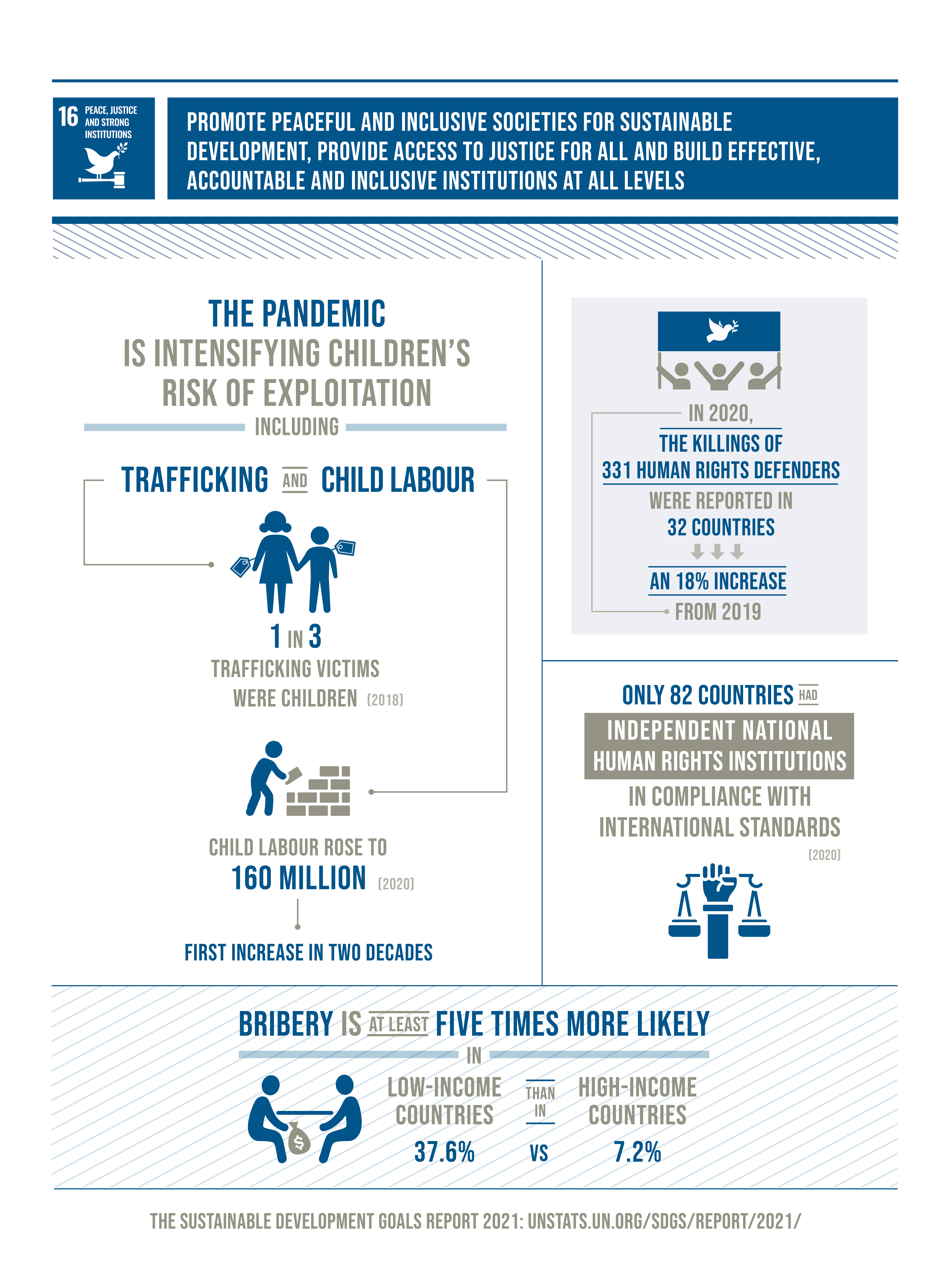



In 2019, the United Nations tracked 357 killings and 30 enforced disappearances of human rights defenders, journalists and trade unionists in 47 countries.
And the births of around one in four children under age 5 worldwide are never officially recorded, depriving them of a proof of legal identity crucial for the protection of their rights and for access to justice and social services.
A few facts and figures:
- Among the institutions most affected by corruption are the judiciary and police.
- Corruption, bribery, theft and tax evasion cost some US $1.26 trillion for developing countries per year; this amount of money could be used to lift those who are living on less than $1.25 a day above $1.25 for at least six years
- Birth registration has occurred for 73 per cent of children under 5, but only 46per cent of Sub-Saharan Africa have had their births registered.
- Approximately 28.5 million primary school age who are out of school live in conflict-affected areas.
- The rule of law and development have a significant interrelation and are mutually reinforcing, making it essential for sustainable development at the national and international level.
- The proportion of prisoners held in detention without sentencing has remained almost constant in the last decade, at 31per cent of all prisoners.
Violence against children
- The number of people fleeing war, persecution and conflict exceeded 70 million in 2018, the highest level recorded by the UN refugee agency (UNHCR) in almost 70 years.
- In 2019, the United Nations tracked 357 killings and 30 enforced disappearances of human rights defenders, journalists and trade unionists in 47 countries.
- Violence against children affects more than 1 billion children around the world and costs societies up to US$ 7 trillion a year.
- 50 per cent of the world’s children experience violence every year.
- Every 7 minutes, somewhere in the world, a child is killed by violence
- 1 in 10 children is sexually abused before the age of 18.
- 9 in 10 children live in countries where corporal punishment is not fully prohibited, leaving 732 million children without legal protection.
- 1 in 3 internet users worldwide is a child and 800 million of them use social media. Any child can become a victim of online violence.
- Child online sexual abuse reports to NCMEC has grown from 1 million in 2014 to 45 million in 2018.
- 246 million children worldwide affected by school-related violence each year.
- 1 in 3 students has been bullied by their peers at school in the last month, and at least 1 in 10 children have experienced cyberbullying.
16.1 Significantly reduce all forms of violence and related death rates everywhere
16.2 End abuse, exploitation, trafficking and all forms of violence against and torture of children
16.3 Promote the rule of law at the national and international levels and ensure equal access to justice for all
16.4 By 2030, significantly reduce illicit financial and arms flows, strengthen the recovery and return of stolen assets and combat all forms of organized crime
16.5 Substantially reduce corruption and bribery in all their forms
16.6 Develop effective, accountable and transparent institutions at all levels
16.7 Ensure responsive, inclusive, participatory and representative decision-making at all levels
16.8 Broaden and strengthen the participation of developing countries in the institutions of global governance
16.9 By 2030, provide legal identity for all, including birth registration
16.10 Ensure public access to information and protect fundamental freedoms, in accordance with national legislation and international agreements
16.A Strengthen relevant national institutions, including through international cooperation, for building capacity at all levels, in particular in developing countries, to prevent violence and combat terrorism and crime
16.B Promote and enforce non-discriminatory laws and policies for sustainable development
The world is still a long way from achieving the goal of building peaceful, just and inclusive societies, with millions of people living in fragile and conflict-affected States. At the end of 2019, 79.5 million people had been forcibly displaced worldwide, equivalent to 1 per cent of the global population. The COVID-19 pandemic has exposed inequalities and discrimination and has tested, weakened, and in some cases shattered rights and protection systems in countries and territories.
Globally, around 437,000 people were victims of homicide in 2019. However, lethal violence is slowly decreasing, and homicide rates declined from 6 victims per 100,000 population in 2015 to 5.7 per 100,000 in 2019. Two thirds of all homicide victims were in sub-Saharan Africa and Latin America and the Caribbean, with no sign of numbers falling in sub-Saharan Africa.
The United Nations recorded 69,276 civilian deaths in 12 of the world’s deadliest armed conflicts between 2018 and 2020. In 2020, there were five civilians killed per 100,000 population, one in seven of which was a woman or child.
Even before the pandemic, violence against children was widespread, affecting victims regardless of wealth or social status. In 77 mostly low- and middle-income countries and territories with available data from 2012 to 2020, 8 in 10 children, ranging from 1 to 14 years of age, had been subjected to some form of psychological aggression or physical punishment at home in the previous month.
In 2018, some 5 in 10 victims of human trafficking detected globally were women and 2 in 10 were girls. Moreover, about one third of all detected victims were children. About 50 per cent of the detected victims were trafficked for sexual exploitation and 38 per cent for forced labour. The sharp rise in unemployment brought about by the pandemic is likely to increase trafficking in persons.
Globally, the proportion of prisoners held in detention in 2019 without being sentenced for a crime remained high at 31 per cent of the total prison population, with no significant change since 2000.
Data from more than 120 countries and territories indicate that people living in low-income countries and territories are those most exposed to bribery. According to the latest data available for the period from 2011 to 2020, the average prevalence of bribery in low-income countries and territories is 37.6 per cent, compared to 7.2 per cent in high-income countries and territories.
Establishment-level data from 145 countries and territories surveyed between 2006 and 2020 indicate that almost one business in six around the world is subject to requests from public officials for bribe payments.
Globally as of January 2021, 31.1 per cent of parliamentarians are 45 years of age or less, up from 28.1 per cent in 2018. Male parliamentarians remain predominant in the leadership positions of speaker and committee chair.
According to data for the period from 2010 to 2020, the births of around one in four children under 5 years of age worldwide were not officially recorded. Only 45 per cent of all children under 5 in sub-Saharan Africa had their births registered
In 2020, the United Nations tracked 331 killings of human rights defenders in 32 countries and territories, an 18 per cent increase on 2019, and 19 enforced disappearances in 14 countries and territories. Women comprised 13 per cent of victims killed and 22 per cent of those forcibly disappeared. A total of 62 journalists were killed in 2020 compared to 57 in 2019, with 65 per cent killed in non-conflict countries and territories.
As of February 2021, laws on access to information have been adopted by 127 countries and territories, although the implementation of the laws could be improved. The pandemic has slowed the pace of progress in this area, with no countries or territories passing such laws in 2020 and a number of countries and territories temporarily suspending existing legal guarantees. Nevertheless, many countries and territories attempted to make data available concerning COVID-19 infections, the contracting of emergency equipment and the allocation of rescue packages and relief financing.
In 2020, the number of independently functioning national human rights institutions in sub-Saharan Africa and Europe increased by three, raising the proportion of countries and territories that had successfully achieved compliance with the Principles and Guidelines on Children Associated with Armed Forces or Armed Groups to 42 per cent. However, progress has stalled in Latin America and the Caribbean, Oceania, Western Asia, and Eastern and South-Eastern Asia, where no new independent national human rights institutions have been recognized or established since 2018.
Governments, civil society and communities must work together to implement lasting solutions to reduce violence, deliver justice, combat corruption and ensure inclusive participation at all times. Freedom to express views, in private and in public, must be guaranteed. From 2015 to 2019, the United Nations recorded at least 1,940 killings and 106 enforced disappearances of human rights defenders, journalists and trade unionists across 81 countries, with over half of killings occurring in Latin America and the Caribbean. Laws and policies must be applied without any form of discrimination. Disputes need to be resolved through functioning and justice systems. National and local institutions must be accountable and need to be in place to deliver basic services to communities equitably and without the need for bribes.
Exercise your right to hold your elected officials to account. Exercise your right to freedom of information and share your opinion with your elected representatives. Promote inclusion and respect towards people of different ethnic origins, religions, gender, sexual orientations or different opinions. Together, we can help to improve conditions for a life of dignity for all.
[Source:- www.un.org]